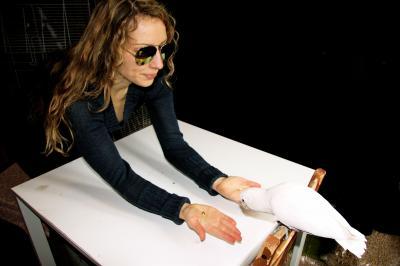Speculative trading of the Goffin cockatoos
A new study at the University of Vienna, on an Indonesian cockatoo species – the Goffin's cockatoo – which recently made headlines, showed notable results. "The animals were allowed to pick up an initial food item and given the opportunity to return it directly into the experimenter's hand after an increasing time delay. If the initial food item had not been nibbled by this time, the bird received another reward of an even higher preferred food type or of a larger quantity than the initial food in exchange" explains Isabelle Laumer, who conducted the study at the Goffin Lab at the University of Vienna. "Although we picked pecan nuts as initial reward which were highly liked by the birds and would under normal circumstances be consumed straight away, we found that all 14 of birds waited for food of higher quality, such as cashew nut for up to 80 seconds", she further reports.

Muffin and 13 other cockatoos showed the skills to wait and trade 'normal' for 'better' or 'more' nuts.
(Photo Credit: Alice Auersperg)
Evolution of self-control
Alice Auersperg, the manager of the Vienna Goffin Lab says: "When exchanging for better qualities, the Goffins acted astonishingly like economic agents, flexibly trading-off between immediate and future benefits. They did so, relative not only to the length of delay, but also to the difference in trade value between the 'currency' and the 'merchandise': they tended to trade their initial items more often for their most preferred food, than for one of intermediate preference value and did not exchange in a control test in which the value of the initial item was higher than that of the expected one". She adds: "While human infants or primates can hold the initial food in their hands, one should also consider that the birds were able to wait, although they had to hold the food in their beaks, directly against their taste organs while waiting. Imagine placing a cookie directly into a toddler's mouth and telling him/her, he/she will only receive a piece of chocolate if the cookie is not nibbled for over a minute".
Thomas Bugnyar, who previously conducted similar studies on ravens and crows, says "Until recently, birds were considered to lack any self-control. When we found that corvids could wait for delayed food, we speculated which socio-ecological conditions could favor the evolution of such skills. To test our ideas we needed clever birds that are distantly related to corvids. Parrots were the obvious choice and the results on Goffins show that we are on the right track".

Alice Auersperg, University of Vienna, is the Goffin Lab Manager.
(Photo Credit: Copyright: Julia Auersperg)

This image shows both hands of the experimenter, each containing a different food reward.
(Photo Credit: Copyright: Alice Auersperg)
Source: University of Vienna